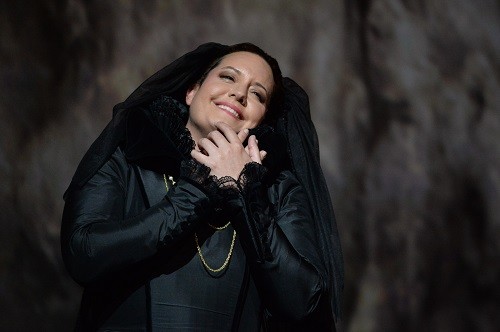
 France Verdi: Don Carlo: Orchestre National Bordeaux Aquitaine, Choeur de l’Opéra National de Bordeaux, Choeur Intermezzo, Paul Daniel (conductor), L’Auditorium de Bordeaux, 27.9.2015 (JMI)
France Verdi: Don Carlo: Orchestre National Bordeaux Aquitaine, Choeur de l’Opéra National de Bordeaux, Choeur Intermezzo, Paul Daniel (conductor), L’Auditorium de Bordeaux, 27.9.2015 (JMI)
New Production:
Direction: Charles Roubaud
Sets: Emmanuelle Favre
Costumes: Katia Duflot
Lighting: Marc Delamézière
Videos: Virgile Koering
Cast:
Don Carlo: Leonardo Caimi
Elisabetta: Elza Van Den Heever
Philip II: Adrian Sâmpetrean
Eboli: Keri Alkema
Posa: Tassis Christoyannis
Inquisitor: Wenwei Zhang
Friar: Patrick Bolleire
Tebaldo: Rihab Chaleb
Heaven’s Voice: Anaïs Constans
Bordeaux began its opera season in the new Auditorium rather than the traditional venue of the Grand Théâtre. The decision to perform Don Carlo here was somewhat unexpected: the stage is limited although there is a pit.
It is the final season for Bordeaux Opera director Thierry Fouquet, who retires at the end of it. His successor is the conductor Marc Minkowski, whose appointment is rather surprising. Mr. Fouquet has been director of the Bordeaux Opera since 1996, and the results of his management have been quite positive. In particular, I would point out his discovery of new talents through his presence on the juries of prestigious singing competitions, in particular Operalia. To cite just one example: South African soprano Elza Van Den Heever, now a regular in the best opera houses of the world, and present every year in Bordeaux since Thierry Fouquet arranged for her debut here eight years ago.
The version of Don Carlo done here is the Italian one in four acts. It was a kind of sui generis performance as far as the stage goes: Charles Roubaud’s design clearly relates to this particular auditorium. The staging is not even minimalist but rather nihilistic ̶ there are no actual sets, just bare walls and virtually no props. The lack of sets is compensated for by excellent videos that create the right atmosphere for the different scenes: a few tombs for San Giusto, some trees for the Veil song, a church (the outside on the stage and the interior above it) for the auto da fe, and a simple grille at the back for the scene of the prison. It’s all very simple yet very adequate. Clearly, the cost must have been a fraction of that for a traditional production, but nothing is missing. The video projections are complemented by excellent lighting. The costumes conform to the historical period of the plot and are well suited, but with two caveats. First, the costumes are lighter than what one sees in many other productions; and it is surprising that the chorus (seated off-stage) is dressed in contemporary street clothes. Each chorister appears to be wearing what he or she brought from home.
Charles Roubaud tells the story directly and effectively. He places the chorus in the auditorium seats behind the orchestra, while the action takes place down on the stage where we see only soloists and some extras. I found the production efficient in every aspect, including the economics. It could be seen as an example to how to avoid the many opera productions of little interest but almost unbearable cost.
Alain Lombard had been announced as conductor, but he cancelled a few days ago due to health problems. He was replaced by the music director of Bordeaux Opera, Paul Daniel. I am convinced that we were better off with the change. Mr. Daniel demonstrated a steady hand, true Verdi sense and lots of energy, drawing a great performance from the Orchestre National Bordeaux Aquitaine. The chorus of the Opéra National was joined by the Choeur Intermezzo, and their performance was excellent.
There were also changes in the cast. Uruguayan tenor Carlo Ventre cancelled his performance as Don Carlo, and the part was sung by the young Italian tenor Leonardo Caimi. He’s a lyric tenor with a very attractive voice that had no problem reaching the audience. The best of his voice lies in the middle range; he had some problems in the passage and was little tight at the top although he reaches the high C. He needs to improve his expressiveness ̶ there’s a certain monotony in his singing.
The best singer in the cast was Elza Van Den Heever, who gave an excellent interpretation of Elisabetta di Valois. Tessitura does not create any problems for her, and she was at her best in the aria “Tu che le vanità.” Let’s hope that the departure of Thierry Fouquet does not prevent us from enjoying this great soprano in Bordeaux in the coming years.
Romanian bass Adrian Sâmpetrean was an effective interpreter of Philip II, although I found him short on nobility and intent more than once, opening sounds excessively and offering a wide voice but not tremendous quality. He did better than I expected with “Ella giammai m’amò” and sang intensely in the scene of the confrontation with the Inquisitor.
I did not enjoy Tassis Christoyannis in the part of Posa. This is a visionary character of extraordinary nobility, ideal for a lyric baritone with an outstanding singing line. This wasn’t the case with Mr. Christoyannis who abused vocal volume at all times. Obviously, the audience did not share my opinion.
American soprano Keri Alkema was a flawless interpreter of Princess Eboli. Bordeaux decided to cast a soprano for this role, which makes sense when singing “O don fatale” matters. Ms. Alkema did very well, a little weak at the bottom of the tessitura but powerful and secure at the top. She was better than many of her colleagues at the Veil song and had no problems in agilities.
Chinese bass Wenwei Zhang was a resounding Grand Inquisitor, and Patrick Bolleire made a good impression as the Friar. Canadian mezzo soprano Rihab Chaleb offered a more important voice than usual in Tebaldo. Anaïs Constans was also good as the voice of Heaven.
José M. Irurzun
